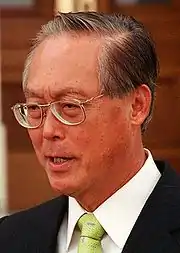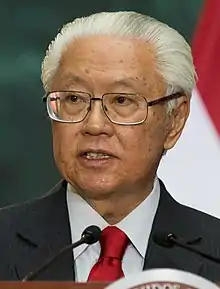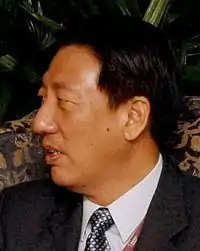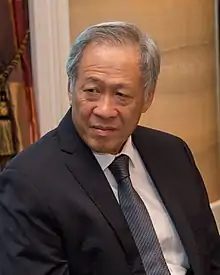Ministry of Defence (Singapore)
The Ministry of Defence (Abbreviation: MINDEF; Malay: Kementerian Pertahanan; Simplified Chinese: 新加坡国防部; Tamil: தற்காப்பு அமைச்சு) is a ministry of the Government of Singapore entrusted with overseeing the national defence needs of the Republic of Singapore.
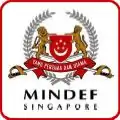 | |
| Agency overview | |
|---|---|
| Formed | 11 August 1970 |
| Preceding agency | |
| Jurisdiction | Government of Singapore |
| Headquarters | MINDEF Building, Gombak Drive, Singapore 1°22′17.77″N 103°45′32.62″E |
| Motto | Safeguarding Singapore's Peace |
| Employees | 282 (2018) [1] |
| Annual budget | |
| Ministers responsible |
|
| Agency executives |
|
| Child agencies | |
| Website | www |
History
MINDEF, together with the Ministry of Home Affairs, was created on 11 August 1970 by splitting up the then Ministry of Interior and Defence.
Responsibilities
MINDEF's mission is to "enhance Singapore's peace and security through deterrence and diplomacy, and should these fail, to secure a swift and decisive victory over the aggressor."[4]
It has a policy of Total Defence which consists of Military Defence, Civil Defence, Economic Defence, Social Defence, Psychological Defence and Digital Defence involving the people, public and private sectors of the country.
Organisational structure
MINDEF oversees a single statutory board, the Defence Science and Technology Agency. It is also the parent ministry of the Singapore Armed Forces, which is in charge of the Republic of Singapore Air Force (RSAF), the Republic of Singapore Navy (RSN), the SAF Military Police Command and the Singapore Army.[5]
Ministers
MINDEF is headed by the Minister for Defence, who is appointed as a member of the Cabinet of Singapore. The position is currently held by Ng Eng Hen from the People's Action Party. [6]
| No. | Portrait | Name (Born-Died) |
Term of office | Political Party | Notes | ||
|---|---|---|---|---|---|---|---|
| Took office | Left office | Time in office | |||||
| 1 | Goh Keng Swee (1918–2010) | 9 August 1965 | 16 August 1967 | 2 years, 7 days | PAP | Served as Deputy Prime Minister from 1968 to 1973 | |
| 2 | Lim Kim San (1916–2006) | 17 August 1967 | 10 August 1970 | 2 years, 358 days | PAP | – | |
| (1) | Goh Keng Swee (1918–2010) | 11 August 1970 | 11 February 1979 | 8 years, 184 days | PAP | Second tenure | |
| 3 | Howe Yoon Chong (1923–2007) | 12 February 1979 | 31 May 1982 | 3 years, 108 days | PAP | – | |
| 4 | Goh Chok Tong (born 1941) | 1 June 1982 | 30 June 1991 | 9 years, 29 days | PAP | Served as Singapore's second Prime Minister from 1990 to 2004 | |
| 5 | Yeo Ning Hong | 1 July 1991 | 1 July 1994 | 3 years, 0 days | PAP | – | |
| 6 | Lee Boon Yang (born 1947) | 2 July 1994 | 1 August 1995 | 1 year, 30 days | PAP | – | |
| 7 | Tony Tan (born 1940) | 1 August 1995 | 1 August 2003 | 8 years, 0 days | PAP | Served as Singapore's 7th President from 2011 to 2017. | |
| 8 | Teo Chee Hean (born 1954) | 1 August 2003 | 20 May 2011 | 7 years, 292 days | PAP | Served as Deputy Prime Minister from 2009 to 2019. Now Senior Minister. | |
| 9 | Ng Eng Hen (born 1958) | 21 May 2011 | Incumbent | 9 years, 259 days | PAP | Second term as of 1 Oct 2015. | |
References
- https://www.singaporebudget.gov.sg/docs/default-source/budget_2019/download/pdf/25-MINDEF-2019.pdf
- "Changes in Permanent Secretary Appointments - 1 November 2019". Public Service Division. 1 November 2019. Retrieved 11 October 2020.
- "Permanent Secretary Appointment - 28 Jan 2019". Public Service Division. 28 January 2019. Retrieved 12 October 2020.
- "About Us: Mission". Ministry of Defence (Singapore). Archived from the original on 5 September 2008. Retrieved 9 January 2009.
- "MINDEF Departments". Singapore Government Directory. Archived from the original on 21 January 2017.
- "PM Lee announces new Cabinet today". AsiaOne. Archived from the original on 21 January 2015. Retrieved 1 October 2015.
External links
| Wikimedia Commons has media related to Ministry of Defence (Singapore). |

